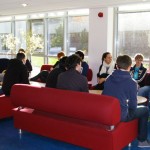Systems software, such as an operating system or a network stack, underlies everything we do on a computer, whether that computer is a desktop machine, a server, a mobile phone, or any embedded device. It is therefore vital that such software operates correctly in all situations. In recent years, dependent types have emerged as a promising approach to ensuring program correctness using languages and verification tools such as Agda and Coq. However, these tools operate at a high level of abstraction and so it can be difficult to map these verified programs to efficient low level code, working with bit-level operations and interacting directly with system services.
In this talk I will describe Idris, a dependently typed programming language implemented with systems programming in mind. I will show how it may be used to implement programs which interact safely with the operating system, in particular how to give precise APIs for verifiable systems programming with external C libraries.
Bio: Edwin Brady is a SICSA Advanced Research Fellow at the University of St Andrews
(http://www.cs.st-andrews.ac.uk/~eb)
Event details
- When: 6th February 2012 14:00 - 15:00
- Where: Phys Theatre C
- Series: CS Colloquia Series
- Format: Colloquium










